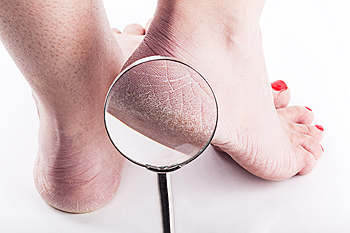
With the warm weather upon us, we are eagerly pulling out our sandals and flip-flops. While this is a welcome trend in some respects, a downside is that it exposes cracked heels, an unsightly, sometimes painful, and potentially unhealthy condition. Wearing footwear such as sandals that expose the heels can lead to dry, cracked heels due to their lack of support and exposure to the elements. When our heels strike the ground while walking or running, the skin around them must be supple and flexible to move and stretch. Dryness and calluses hinder this flexibility, causing the skin to crack and split. To combat this condition, shoes with heel cups can be worn for better support and cushioning. Socks can also help prevent skin friction against the shoe's material. Hydrating well and moisturizing the feet regularly is particularly effective. If underlying causes for cracked heels, such as diabetes, contribute to cracked heels, they must be addressed to prevent recurrence. If you suffer from this uncomfortable ailment, it is suggested that you make an appointment with a podiatrist for a proper examination and individualized treatment.
Cracked heels are unsightly and can cause further damage to your shoes and feet. If you have any concerns, contact one of our podiatrists from Active Foot and Ankle Care, LLC. Our doctors can provide the care you need to keep you pain-free and on your feet.
Cracked Heels
Cracked heels appear unappealing and can make it harder for you walk around in sandals. Aside from looking unpleasant, cracked heels can also tear stockings, socks, and wear out your shoes. There are several methods to help restore a cracked heel and prevent further damage.
How Do You Get Them?
Dry skin is the number one culprit in creating cracked heels. Many athletes, walkers, joggers, and even swimmers suffer from cracked heels. Age and skin oil production play a role to getting cracked heels as well.
Promote Healing
Over the counter medicines can help, especially for those that need instant relief or who suffer from chronic dry feet.
Wear Socks – Wearing socks with medicated creams helps lock in moisture.
Moisturizers – Applying both day and night will help alleviate dryness which causes cracking.
Pumice Stones – These exfoliate and remove dead skin, which allows for smoother moisturizer application and better absorption into the skin.
Change in Diet
Eating healthy with a well-balanced diet will give the skin a fresh and radiant look. Your body responds to the kinds of food you ingest. Omega-3 fatty acids and zinc supplements can also revitalize skin tissue.
Most importantly, seek professional help if unsure how to proceed in treating cracked heels. A podiatrist will help you with any questions or information needed.
If you have any questions, please feel free to contact our offices located in Fair Lawn, Riverdale, and Englewood, NJ . We offer the newest diagnostic and treatment technologies for all your foot care needs.






